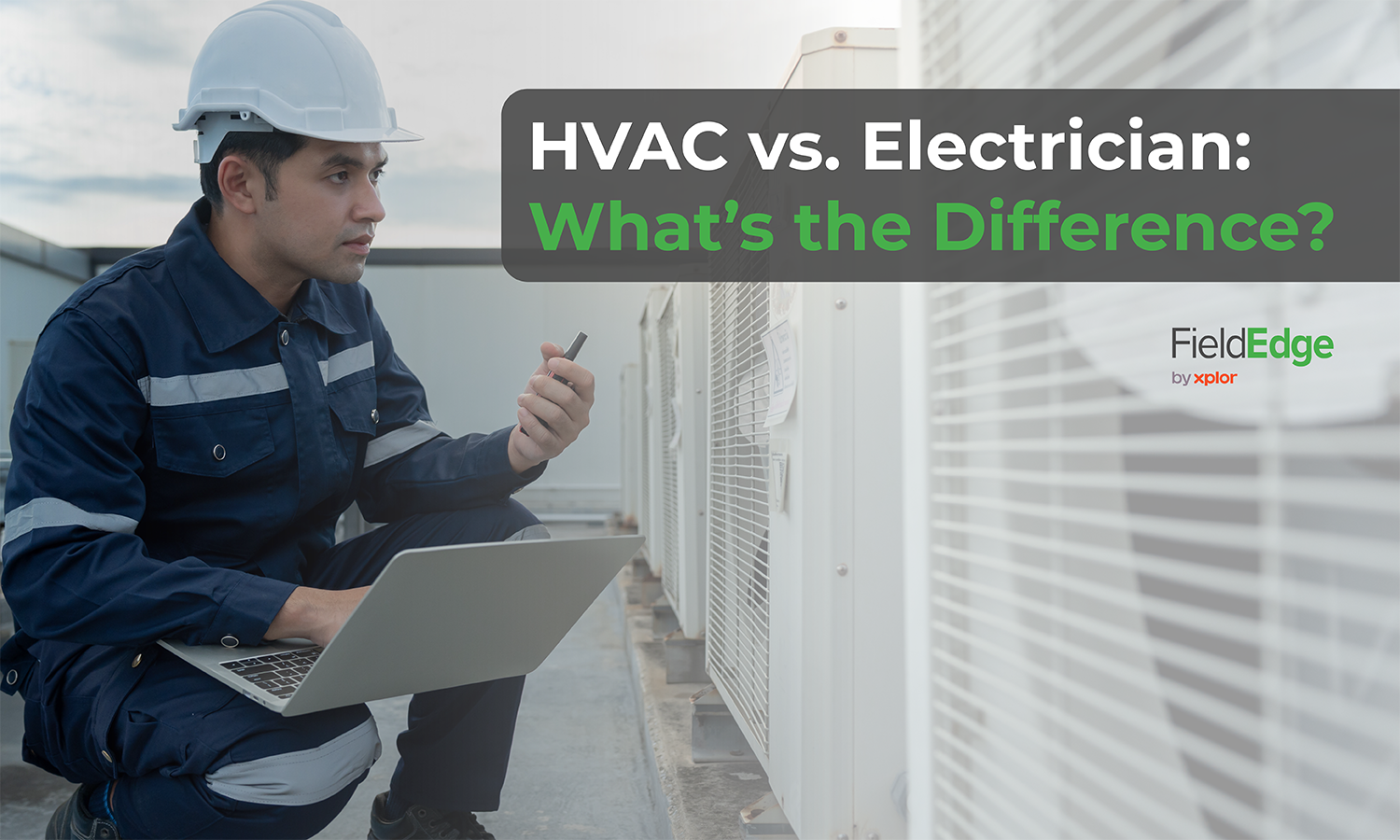Choosing a career path or hiring for a specific service can often come down to understanding the differences between professions. In the trades, two critical and often compared roles are HVAC vs. electrician professionals.
This article will examine the distinctions between HVAC vs. electrician careers, exploring their job responsibilities, training requirements and career prospects. By the end, you’ll have a clear understanding of what sets these two vital professions apart.
In this blog, we will cover:
- HVAC and Electrician Roles
- Key Job Responsibilities
- Training and Certification Requirements
- Career Prospects and Salaries
- Choosing the Right Career Path
Defining HVAC vs. Electrician Roles
Before we compare the two careers, let’s discuss the key differences between HVAC vs. electrician roles.
HVAC Technicians
HVAC technicians are skilled professionals who install, maintain/repair heating, cooling and ventilation systems. Their work ensures that residential, commercial and industrial environments maintain comfortable and safe air quality and temperature levels.
Electricians
Electricians are trained to install, maintain/repair electrical systems in various settings, including homes, businesses and industrial facilities. They work with wiring, circuit breakers, transformers and other electrical components to ensure that buildings have reliable and safe electricity.
Key Job Responsibilities
Next, let’s dive further into the particular job responsibilities of HVAC vs. electrician responsibilities.
HVAC Technicians
Installation and Maintenance:
- Installing HVAC systems in homes, buildings or replacing old systems.
- Conducting routine maintenance to ensure systems operate efficiently.
Diagnostics and Repairs:
- Diagnosing issues with HVAC systems using specialized tools.
- Performing repairs on components such as compressors, thermostats and ductwork.
System Optimization:
- Adjusting system controls to improve efficiency and performance.
- Advising clients on energy-saving practices and upgrades.
Electricians
Installation:
- Installing wiring and electrical components in new constructions.
- Ensuring systems comply with building codes and safety regulations.
Maintenance and Repairs:
- Troubleshooting electrical issues and repairing faulty components.
- Upgrading electrical systems to meet increased demand or new safety standards.
Safety and Compliance:
- Inspecting electrical systems to ensure they are safe and functional.
- Keeping up with changes in electrical codes and regulations.
Training and Certification Requirements
What type of training is required to be an HVAC technician or electrician? Though similar there are some differences.
HVAC Technicians
Educational Path:
- Most HVAC technicians complete a postsecondary program at a technical school or community college, which typically takes 6 months – 2 years.
- These programs cover topics such as refrigeration, system design and electronics.
Certification and Licensing:
- Certification from organizations like North American Technician Excellence (i.e. NATE) is highly valued.
- Many states require HVAC technicians to be licensed, which involves passing an exam.
Electricians
Educational Path:
- Electricians usually start with an apprenticeship program, which combines paid on-the-job training with classroom instruction. Apprenticeships typically last 4 – 5 years.
- Classroom education covers electrical theory, blueprint reading and safety practices.
Certification and Licensing:
- Upon completing an apprenticeship, electricians must pass a licensing exam to become a journeyman.
- Further certification, such as becoming a master electrician, often requires additional experience and exams.
Career Prospects and Salaries
Now, we’ll look at the pay and benefits of both jobs as well as the future outlook for each trade.
HVAC Technicians
Job Outlook:
- The demand for HVAC technicians is expected to grow due to the increasing need for energy-efficient systems and the regular maintenance required for HVAC units.
- According to the Bureau of Labor Statistics (i.e. BLS), employment of HVAC technicians is projected to grow 6% from 2022 – 2032
Salary:
- The median annual wage for HVAC technicians was $57,424 in 2024, with the highest earning $94,180.
Electricians
Job Outlook:
- Employment for electricians is also projected to grow, driven by new construction and the need to maintain and upgrade older electrical systems.
- The BLS projects a 6% growth in electrician jobs from 2019 – 2029.
Salary:
Choosing the Right Career Path
What type of person would do well as an HVAC technician? Who is better cut out for a career as an electrician? Let’s review it below.
Interests and Skills
HVAC Technicians:
- A career in HVAC might be suitable for those who enjoy mechanical work and problem-solving.
- It involves working with complex systems and requires strong diagnostic skills.
Electricians:
- This career is ideal for individuals who are detail-oriented and enjoy working with their hands.
- Electricians need a strong understanding of electrical theory and must be able to work safely under potentially hazardous conditions.
Work Environment
HVAC Technicians:
- HVAC technicians often work indoors and outdoors, sometimes in extreme temperatures when repairing or installing systems.
- The job may require working in confined spaces like attics and crawl spaces.
Electricians:
- Electricians work in a variety of settings, including homes, businesses and industrial sites.
- The job can involve working at heights, in tight spaces and in potentially dangerous environments.
HVAC vs. Electricians—Two of the Heavyweight Trades!
Now, you have a better understanding of these two professions. Understanding the differences between HVAC vs. electrician roles can help you make an informed decision about your career path or hiring needs.
Both professions are essential to modern living and offer rewarding careers with growth potential.
Here are a few things to remember:
- Job Responsibilities: HVAC technicians focus on climate control systems, while electricians work with electrical systems.
- Training: HVAC technicians often attend technical schools, whereas electricians typically complete apprenticeships.
- Career Prospects: Both fields offer strong job growth and competitive salaries.
- Choosing a Path: Consider your interests, skills and preferred work environment.
By evaluating these factors, you can choose the right career path or find the best professional to meet your needs. Both HVAC technicians and electricians play vital roles in maintaining the comfort and safety of our living and working environments.
Related: Plumber vs. Electrician Salary: Comparing Compensation in the Trades



